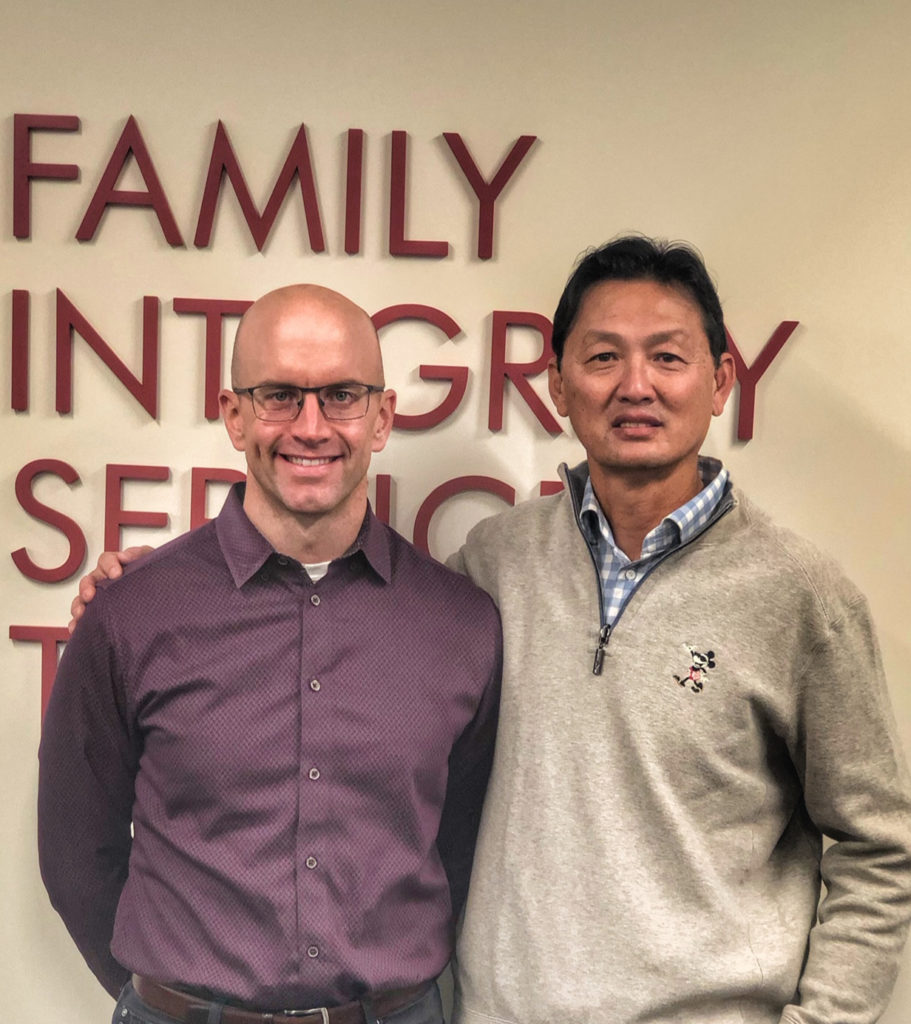Lap Tran has worked at Hoffer Plastics for 34 years. He is part of our family. A few months ago, Lap let me know that he was coming up on the 40th anniversary of his arrival to the United States. He then surprised me by asking me to write a story about it. I thought about it his request for about a week and decided his words would be better than mine. So after a little coaxing, we sat down on a recent Friday afternoon and had a two hour conversation. What follows are my questions in bold, followed by Lap’s answers. I post this on the actual day, October 29, that Lap arrived at O’Hare International Airport, but the story began back in Vietnam…
When did you leave Vietnam? November 25, 1978.
Why did you leave Vietnam? I wanted to escape. I can’t live with the communist.
What about the communists couldn’t you live with? How they treat people. You have no freedom of speech. School, you had no choice. You had to do what they told you to do. If a dog was walking by and they called it a pig, you had to call it a pig.
Can you give me an example of something you saw that you couldn’t live with? I had a friend that suddenly disappeared and never saw him again.
Tell me about life in 1978 leading up to this? My village had a soccer tournament playing against the team from Saigon. My village invited me to come home to play against the team from Saigon. At the time, I was playing professional soccer in Saigon. This was my second year playing professional soccer in Saigon. So, I came home to play the game and arrive Tuesday prior to Sunday’s game. I spent the week practicing and I escaped Saturday prior to the game.
Why did you choose Saturday – and I am assuming it was at night? Yes, it was at night. My family had a plan for me to escape Vietnam. But, it was not that time. When I came back for the week of practice, some of the people that owned the boat that would be used for my escape told me about their plan to escape. They had three families that were going to escape at that time, but they feared that the government had found out about it. So they had to go and they invited me to go with. My sister and brother were also supposed to be on that boat, but they were not in the village at the time. And because of the government, we had to leave immediately.
Can you tell me more about the escape? It was night time. I was supposed to go down to have a meeting for the soccer team about the next day’s game, instead I continued to go to the boat. About 10 p.m. at night I got down to the river and got on one of the three little boats.
How many people were on each boat? On the boat that I got on there were only four people. There were only adults on my boat, but there were women and children on the other two. Our plan was to use these three boats to get from the river down to the ocean. Once we got to the ocean, we would all join on one boat.
What happened next? These boats were acting like they were going fishing. So they first have to stop at the guard station before being allowed to enter the ocean. So the three boats parked at the guard station, while each of us hid under fishing nets or whatever we could find to conceal ourselves from the guards. The guards allowed us to go on, and just when we thought we were in the free, one of the smallest kids began crying. At this point, the guards began shouting for us to STOP. We couldn’t stop because if we stopped they would catch us, and we most likely would have been sent to prison camp in the jungle. Everyone that went to the prison camp in the jungle never came back.
So what did the guards do next? They began shooting at all three boats…
Was anybody hit? A few people on the boat were shot, but none fatally. At least yet.
What happened next? We got to the ocean and put everybody in one boat so we could save gas. This included transferring the wounded people as well. Our intended destination was the Philippines. So we set out for the Philippines because it was a free country, yet after four days on the water, we assumed we had missed it. I didn’t know that we had missed, but the fishing guides were confident we had.
What did you eat or drink on the boat during those four days? We had some food that we brought along. We also had some water. But, I was immediately sea sick on the ocean and couldn’t eat or drink.
What happened to the wounded? They kept getting worse and worse during this time. (My note – it is apparent that these four didn’t make it. It was also apparent that this memory was very difficult to talk about. So, I decided to stop asking about it).
So what happens after four days? We don’t have any directions, so the fishing guide is just stirring the ship by using the moon and sun. After they missed the island, they decided to turn the ship. But they were debating about how much turn to because they didn’t want to turn and go back to Vietnam. They wanted to turn and get to Malaysia or Singapore. Eventually, a week later, we ended up in Malaysia.
You were on the water for close to 11 days? Yeah…
Were you seasick the entire time? I was still seasick and couldn’t walk at all. The only reason I could survive is that my brother, who had left Vietnam before the fall of Saigon and ended up in Paris, had sent me a multivitamin. So I took this every day on the water and it probably saved my life.
How was everyone else on the boat doing? Every else was doing fine. They were eating and drinking well. The only exception were the ones who were shot. I was the only “city boy” and that’s why I was doing bad.
So what happened when you got to Malaysia? Because there were too many boat people from Vietnam, we were turned away. They told us to go to Singapore. We felt really safe because we could ride along the coast line from Malaysia to Singapore. When we got to Singapore, the government there wouldn’t allow us to come in either.
For the same reason? Yes
So where did you go from here? We hung out in the Bay Area where all the International ships parked. One of the Korean ships saw us, they took pity on us after we were asking for water and food (all that had run out). They told us to follow them to international water because they couldn’t do anything for us in Singapore water. We were communicating through sign language but somehow could understand enough to follow. When we got to International water, they asked us if we wanted to go to Korea. Of course we did, so we got on the boat after they put the ladder down.
Could you climb the ladder? No, they had to send a guy down to pick me up. They literally carried me up the ladder to the ship. Unfortunately, I would still be sea sick on this ship as well.
Was the trip from Singapore to Korea easy? No. Within four hours the Captain found out that his government did not want to pick us up either. But we were already on the ship. So, he tried contacting Hong Kong, Philippines, or anyone that would take us in. Nobody would. So without a boat, or anything, he had to take us to Korea.
Did they give you food and water on the ship? Of course. But I was still sick.
What happened when you got to Korea? The Korean government came out and they punished the captain.
What did they do to him? They hit him in front of us.
Looking back all these years later, do you think the captain is a hero? No, he is. He absolutely is a hero for us.
In a sense, did he save your life? He saved a lot of lives…
What happened after the captain got beat? They sent in the Red Cross to pick up all of us and bring us to a Red Cross refugee camp.
Any idea where your camp was located? Busan city, Korea. Ironically, we landed here on Christmas Day. December 25, 1978.
Where did you after you left the ship? They took me directly to the hospital, while everyone else went to the refugee camp. I was transferred there a few days later when I was okay.
What was camp life like? We had food, we had everything we needed. Everything except our freedom. We couldn’t leave the camp.
When you were well, and back in the camp, what was your plan? I needed to put an application in to go to another country. I could pick three countries, and I picked France as number one because my brother was there. Number two was the United States. And number three was Canada. I was twenty years old and didn’t know much.
What happened with the application? 3 months later, I received word that France was coming to interview me. I qualified to go to France after the interview.
So why aren’t we doing this interview in French? During that time, I received a letter from my dad who was still in Vietnam. He told me not to go to France. I found out later that was because my family feared for me not making it in France. Rather, he wanted me to go to the United States because he felt like there was a lot of opportunity there.
How did your dad know that you were in a refugee camp in Korea? When I landed in Korea, the government in Korea allowed us to contact our family. So I sent my brother in France a telegram letting him know where I was at. He then told my parents.
What did you think of your dad’s advice? All I wanted was to get out of Korea at that time, so I just listened to my dad. However, I came to find out I was not qualified for the United States.
Why weren’t you qualified for the United States? The United States had selection criteria for who qualified. First, anyone who worked for the U.S. government in Vietnam were qualified. Next, came anyone who had family currently living in the United States. Third, if you were younger than 18. Fourth, anyone who had any extended family. And on and on it went. I didn’t have anyone over in the United States, so I was at the back of the line. I put my name in and took my chance.
So you just lived in the refugee camp during that time? Yes.
When did your name get called? 9 months later, I received a letter at camp that told me I was okayed to go the United States. It said I could go to Elgin, Illinois, and that a church group there had sponsored me.
What did you feel in that moment? I felt numb, nervous, and scared. I didn’t know a word of English.
When did you leave the camp? A couple months after I received the letter, they put me on a train headed for Seoul. When I got to Seoul, they took me to the U.S. embassy. There the U.S. ambassador’s wife gave me five dollars.
What do you remember about the U.S. Ambassador’s wife? She had brown hair, she was tall, and she was very nice and helpful. She told me that if I go to Chicago and if nobody comes to pick me up, use the five dollars to call a number that she handed me.
Do you remember what the number was for? The number was for the church in Elgin to let them know I was there in Chicago. It was just in case.
How did this make you feel? It made me feel really good.
Less nervous? No. (Laughs) I didn’t know anything about the United States.
How was the flight over from Korea? I freaked out about the flight before hand, but it wasn’t too bad. It was just really long.
What happened when you landed in Chicago? All I had was five dollars in my pocket, a toothbrush, and a stack of papers. Welcome to America!
What day did you arrive? October 29, 1979.
Were the people picking you up there when you arrived? Yes, they took me back to Elgin and gave me a place to stay at one of their houses. The next day, they passed me off to local Vietnamese people already in Elgin. So they started helping me setup English classes, finding a place to live, and teaching me how to start my life…
Where did you live first? I lived at an apartment on the east side of Elgin, off Porter Street.
What are earliest memories of American culture? I had never seen snow before in my life. I had never felt cold weather in my life. So these are the things that first come to mind. I was also in shock by all the farm land around Elgin because in my mind I always thought of the United States as all New York City.
Did you meet anyone from Vietnam that helped you get acclimated to the American lifestyle? I found out that my future wife’s family already lived in Elgin. It turns out that their family —who I knew back in Vietnam —heard about me trying to get to the United States, and were part of the church sponsoring me coming. So when I arrived, they found me after the church people brought me to Elgin. They only had been in the United States for three months to a year.
Did you already know your wife, Connie? Yes, I knew her back in Vietnam. My older brother was (and still is) married to her older sister.
Was Connie in the United States when you arrived? Yes.
What was she up to? She was going to Elgin High School. I ended up going to Elgin Community College at that time.
When you start dating Connie? It wasn’t until much later —1982–and we were married in 1984. But, we knew of each other when I arrived in the United States.
Back to your education, where were you studying English? The YWCA in Elgin. Back then, they had a program called CTA. It was basically a program that paid us to go to school and learn skills that we could use later. I also went to ECC for two years where I studied about machines and tools.
Why were you interested in machines and tools? I went to a technical school in Vietnam before and thought that was what I could do here.
What was your first full time job? Union Special in Huntley. I was a machine operator there and worked there from 1983-1985.
What made you leave your first full time job? While taking courses at ECC, one of the instructors (Maurice Muntz) knew Al Horn and Al Horn worked at Hoffer Plastics. Al Horn said that he had a tool room apprentice spot open at Hoffer, and Mr. Muntz told me that I should go apply for this job because that was what I was going to school for.
What happened next in the hiring process? I met Al Horn at 7 a.m. in the morning. It was a Saturday. When I was walking in, Al didn’t even talk to me because he didn’t think I was the Vietnamese guy that he was looking for. This was because I am tall, and Al assumed that I would be a short guy because most Vietnamese are! I still laugh about this to this day. He then interviewed me and offered me a job. However, I had to wait four weeks to begin because tool room four was still under construction.
When did Hoffer Plastics hire you? June 1985.
What’s your earliest memory working at Hoffer Plastics? Walking in the first day and reporting to Brian Wagner. The first memory was probably before that, when I met Earl Boehne, the Plant 5 manager. He went out of his way to welcome me to Hoffer Plastics.
How did that make you feel? It made me feel really good, welcomed, and like I was going to be part of something.
What’s your next memory? I worked with Brian Wagner and another new tool room apprentice. Everyone on that team was really helpful, friendly, and willing to show me things. They were willing to teach. During that time, I worked about 60-65 hours per week, went to school at night, and did the homework at night. I had to put in a lot of effort —110%—and basically give it my all. I was getting home around 11 to 11:30 PM each night, and had a little girl at home that I barely saw, and it was that way for about four years.
What happened after the four years? With all the hard work, and what I had learned, I was in a good position for advancement. One day, I saw your grandfather and told him that I wanted to be the next Brian Wagner and lead a tool room. I asked him if he could help me get there.
How did he respond? He told me that the next day I should come to his office and he would have a meeting with Leo Nelson (HR Director) to find a way to help me pursue my ambition.
You had a special relationship with my grandfather, tell me about it… (Deep breath). He treated me really well. What I have today is all about him. He is not only the owner of the company, he is also my mentor, my father, and makes me feel like I am one of his sons. When my daughter and son were in the gifted program at Elgin High School, Bob would go to the award ceremony and brag about my kids and tell people “that’s the daughter of the guy working for us at Hoffer Plastics.” He really made me feel like he was proud of what I could achieve in life.
What is your favorite memory of him? He called me to take the van from the company to go to his house and pick up all the bonsai trees and take them to the nursery. Before I left the house, he told me exactly how much all the trees cost and then said, “So, be careful” (with a smile). For me it is a lot about him.
What is a lot about him? It is a family. It is a joy to work with him. He doesn’t make me feel uncomfortable. He was easy to talk to. I would go to him for every personal situation I had. I would tell him about everything. Basically, everything I earned here is because of him and Hoffer Plastics. So, every year on February 21 (the day he passed away), I go to his grave and pray for 10-15 minutes. I also like to talk about how life’s been going the last year.
What are your thoughts about Hoffer Plastics? This is more than work, it is family. It is something that I have given everything to. It is a special place to work. This is basically my life. I have lived in the United States for 40 years now, and I have worked at Hoffer Plastics for 34.
What’s the one piece advice you would have for me —and the rest of the third generation at Hoffer Plastics? For you, to be yourself. I think you have really come a long way. Lean into the production side. Build more into the people on the floor. You are getting taken out to sales meetings too much. Get stronger help there and invest more in people here.
What do you think grandpa Hoffer would advise me to do? He would want you to get to know everyone at Hoffer Plastics. He would want everyone at Hoffer to want to know you. He would want them to open up to you. They are doing that. Just keep working on that.
What’s the last thing you want to say to commemorate your 40 years in the United States? I am grateful to find a company like Hoffer Plastics so I can work and support my family. My kids are really successful, and my life is really good.








